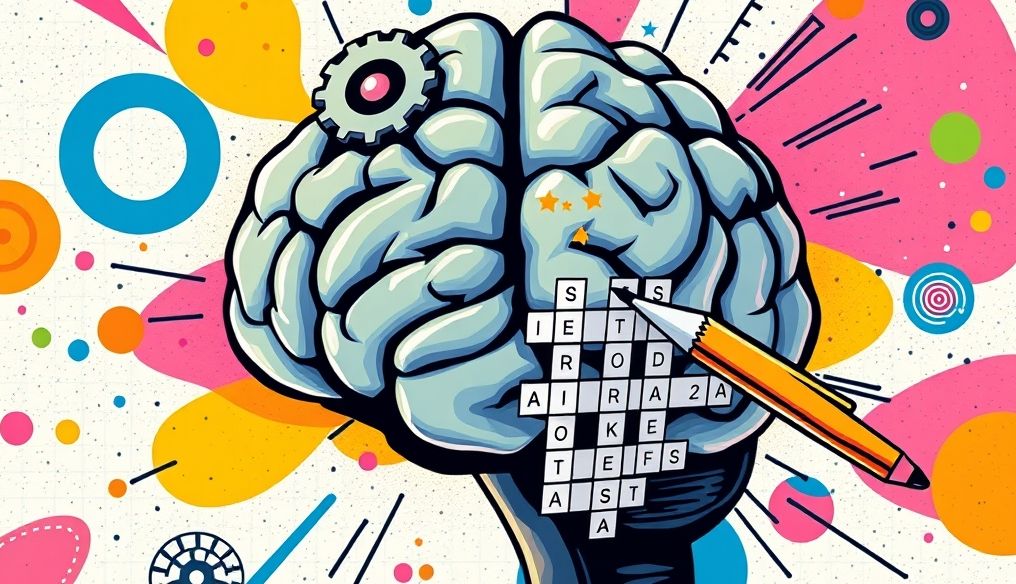Do Sudoku and Crossword Puzzles Really Strengthen the Brain and Protect Against Dementia?
Sudoku and crossword puzzles have long been beloved activities for many, but are they just entertainment or do they offer real benefits for the brain? The answer is complex, but research suggests that these games may play an important role in maintaining brain health and reducing the risk of dementia.
What are Sudoku and Crossword Puzzles?
Sudoku: is a logical puzzle game based on filling a 9x9 grid with numbers from 1 to 9, so that no number is repeated in one row, one column, or one 3x3 box.
Crossword Puzzles: is a puzzle game based on filling a grid of squares with words that intersect each other, based on a set of definitions or clues.
How do these Games Stimulate the Brain?
Both games stimulate different areas of the brain, enhancing its cognitive functions:
- Memory: Requires remembering rules, words, and previous clues.
- Logic and Reasoning: Requires analyzing information and deducing solutions.
- Focus and Attention: Requires focusing on the game and avoiding distraction.
- Problem Solving: Requires finding innovative ways to solve puzzles.
- Cognitive Flexibility: The ability to switch between different tasks and adapt strategies.
Scientific Evidence: Does it Support the Benefits of these Games?
Many studies have shown promising results regarding the benefits of Sudoku and crossword puzzles for the brain:
Studies on Sudoku:
Some studies suggest that practicing Sudoku regularly can improve working memory, attention, and concentration, especially in older adults.
Studies on Crossword Puzzles:
Other studies have found that solving crossword puzzles regularly is associated with improved verbal memory and problem-solving ability, and may reduce the risk of dementia.
Exeter University Study:
A large-scale study conducted by the University of Exeter in the United Kingdom showed that people who regularly solve crossword puzzles have better brain function later in life. The study suggested that this activity may help keep the brain active and flexible.
Can Brain Games Prevent Dementia?
Although the research is promising, there is no conclusive evidence that brain games, including Sudoku and crossword puzzles, can completely prevent dementia. However, evidence suggests that they may contribute to delaying the onset of symptoms or slowing the progression of the disease.
What are Other Risk Factors for Dementia?
It is important to recognize that dementia is a complex disease that is affected by many factors, including:
- Age: The risk of developing dementia increases with age.
- Family History: Having a family history of dementia increases the risk of developing it.
- Lifestyle Factors: Smoking, unhealthy diet, lack of physical activity, high blood pressure, high cholesterol, and diabetes.
- Head Injuries: Repeated head injuries may increase the risk of developing dementia.
Tips to Promote Brain Health and Reduce the Risk of Dementia:
In addition to playing brain games, there are many other things you can do to promote your brain health and reduce the risk of dementia:
- Exercise Regularly: Exercise improves blood flow to the brain and enhances its functions.
- Eat a Healthy Diet: Eat foods rich in fruits, vegetables, whole grains, and healthy fats.
- Maintain a Healthy Weight: Obesity increases the risk of developing dementia.
- Get Enough Sleep: Getting enough sleep is essential for brain health.
- Control Blood Pressure, Cholesterol, and Diabetes: These health conditions can increase the risk of developing dementia.
- Stay Socially Active: Interacting with others stimulates the brain and improves mood.
- Learn New Things: Learning new skills keeps the brain active and flexible.
- Quit Smoking: Smoking increases the risk of developing dementia.
How to Incorporate Sudoku and Crossword Puzzles into Your Daily Routine?
Here are some tips for incorporating these games into your daily life:
- Start Slowly: If you are new to these games, start with easy puzzles and gradually increase the difficulty.
- Set a Specific Time: Set a specific time each day or week to play.
- Make it Fun: Choose puzzles that you enjoy.
- Play with Friends or Family: These games can be more fun when played with others.
- Use a Variety of Sources: Look for puzzles in newspapers, magazines, books, and online applications.
Conclusion
Although Sudoku and crossword puzzles are not a magic bullet for preventing dementia, they can be a valuable part of a comprehensive strategy for maintaining brain health. By stimulating the brain and improving its cognitive functions, these games may help delay the onset of symptoms or slow the progression of the disease. In addition, exercising regularly, eating a healthy diet, maintaining a healthy weight, getting enough sleep, staying socially active, learning new things, and quitting smoking are all important factors in promoting brain health and reducing the risk of dementia.




